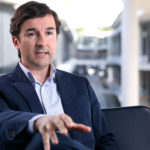Ricardo Forcano, the Global Head of Engineering and Organization at BBVA, participated in a digital meeting organized by the Association for Managerial Progress (APD) entitled ‘Innovation and culture for organizational growth’. During the event, the director explained how the current situation can serve as an impetus to redesign work methods in organizations. He also explained that BBVA is using collective intelligence and data to face the current crisis.

The current health crisis has posed an unprecedented challenge for corporate organizations, which have had to quickly adapt to new realities, like remote work for most employees, in record time. For Ricardo Forcano, the Global Head of Engineering and Organization at BBVA, these circumstances should lead us to reflect on work methods that could endure beyond the crisis. “We now have a unique opportunity to rethink and redesign the way we work. Not just work methods, but talent management in general: how we attract and retain talent, and how we can conceive talent in the most decentralized way, not pinned on on certain physical locations.”
This is what he explained during his presentation at a digital meeting organized by APD, which addressed how the coronavirus crisis is affecting companies’ innovation capacities. During the meeting, the BBVA director discussed in detail the key factors that are guiding BBVA’s transformation process to become a “smart organization” - capable of anticipating, reacting and adapting to the changes that take place in society - and how this commitment is serving to face the challenges posed by the Covid-19 crisis.
In this regard, the BBVA director addressed three concepts around which a smart organization constructs itself, going from individual intelligence to collective intelligence thanks to the new ways of working, and also taking the leap toward augmented intelligence based on the use of data.
The process of going from “individual intelligence” to “collective intelligence” through organizational change based on agile methodologies makes it possible to harness the teams’ talent in a decentralized manner “in the framework of a common purpose and a set of shared values”.
Forcano explained how the benefits of this strategy were clearly demonstrated during the crisis, when BBVA defined the priority of protecting the health of people, employees and customers. “We were able to align tens of thousands of people around a common purpose. It has demonstrated that when you have that foundation - when you are truly capable of aligning thousands of people around the same vision and purpose - it lets you give the teams a lot of space to be very autonomous in finding solutions and making decisions, which is what we needed at that time to act swiftly,” he explained. He specifically underscored how this way of working was fundamental to the bank being capable of rolling out teleworking in Spain for over 90 percent of central services employees and more than 70 percent of branch employees “in just a week”. This was possible, according to the director, “thanks to the teams, which made decisions autonomously regarding how to scale our infrastructure, how to develop authentication solutions for teleworking, etc.” to adapt to the situation.
A return based on data
The second leap toward a “smart organization”, according to Forcano, entails evolving from “natural intelligence” to “augmented intelligence” thanks to the use of advanced analytics techniques that are made available to teams to increase their capacities and allow them to make the best decisions based on data. In this regard, the director explained that it is a key pillar that has been essential in defining the bank’s plan to return to the offices after the lockdown. “Our approach has been to do so based on data and analytics instead of predefining each of the phases, what percentage of people will return, on what date, etc.” Instead, the bank is committed to using analytical capacities to “understand the situation and make decisions in a dynamic manner.” A series of data scrum teams were established for this purpose, whose work is facilitating the opening of the network of branches in Spain.
The bank is committed to using analytical capacities to understand the situation and make decisions in a dynamic manner
Therefore, he explained, the level of commercial activity is monitored on a daily basis in each branch, at the ATMs and at points of sale, as well as the activity levels within the branches, at tellers, and customer lines. “Thus we can dynamically define which branches we open at each point of Spain, and which employees need to start returning to these branches,” he indicated. According to the director, it is a “good example of how data and analytical capabilities allow us to enhance our understanding of the situation and our ability to make decisions in a better, more agile way.”
Continuous learning
Finally, Forcano described the third pillar that makes it possible to devise strategies for the development of a smart organization: a culture of “continuous learning”. This is possible thanks to training initiatives that incentivize employees to constantly update their knowledge and share this learning with the rest of the employees in the organization. Some examples include B-token system and the digital talent Ninja program, which was recently rolled out for Mahou San Miguel employees to support them in their transformation process. “These processes, incentives and structures need to be created so that these teams that are interconnected go beyond their everyday work to spend time on quality in a structured manner, and sharing knowledge with each other,” he added.
The commitment to these knowledge programs has remained throughout the crisis, and has even been reinforced through digital channels, according to Forcano. One example of this was the Ninja community’s global ‘hackathon’ last week. More than 1,000 people from seven different BBVA locations participated. “We let the countries’ ninjas support their local teams through MOOCs [massive open online courses] and as a result, more than 4,000 of these online courses and over 2,000 hours of training were provided in less than 48 hours,” he concluded.